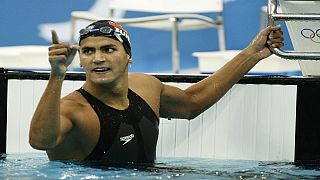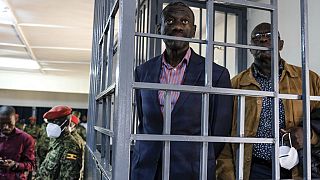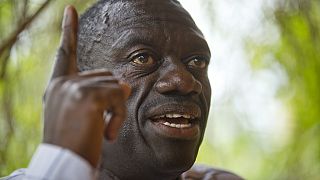Kenya
Fishermen of the Lamu County, on the Northen coast of Kenya, took to the sea with their dhows to protest against rising tensions between the Kenyan and Somalian authorities, over their long-running maritime border dispute.
Since 2014, Somalia has been asking the UN's International Court of Justice to rule over contested waters of the Indian Ocean.
But with Kenyan representatives refusing to partake in the hearings, negociations seem to have hit a deadlock.
"It is not too late for both countries, Somali and Kenya, to explore other obvious channels including the IGAD, the African Union or even our Elders, who have settled such differences for centuries", says Is’Haq Abubakar, of the Save Lamu movement.
"The people of Lamu and our brothers in Somali have coexisted for centuries and continue to consider the current boundaries simply as colonial lines drawn neither to the interest of Kenya or Somali people" adds Is’Haq Abubakar.
Lamu County livelihoods threatened
The disputed waters who are rich in fish, are crucial to the people of Lamu County. For long they have subsisted thanks to sea.
But with the ongoing dispute, the livelihood of many is threatened.
"I can say if we are losing fishing we can say we are losing fifty percent of our livelihood, because normally our community Lamu is not educated, and in Lamu county we don't have any industry to be invested, so if we lose fishing ground we are totally losing our life" explains Adam Lali Kombo, a fisherman of Kiunga, just kilometers away from the Somalia border.
The waters where these fishermen get their fish are currently administered by Kenya, but Somalian authorities claim they should be included in its territory.
Mogadiscio wishes to extend its maritime frontier with Kenya along the line of the land border, in a southeasterly direction.
Kenya, on the other hand, wants the border to remain heading out to sea, in a straight line east, giving it more territory.
Kenyans have reacted on social media with hashtags such as #NotAnInchLess and #ItsOurSea to protest claims from the Somalian government.
The disputed triangle of water that stretches over an area of more than 100,000 square kilometres not only houses many sea life crucial to fishermen on both sides of the border, but might also contain substantial crude oil reserves.
The ICJ proceeds with the hearings
Despite Kenya's absence, the ICJ has decided to proceed with the deposition of Somalian authorities.
ICJ President Joan Donoghue said it regretted Nairobi's refusal to attend the hearings, but added the court would go ahead with hearing Somalia's case, and would use written evidence provided by Kenya instead.
Somalia criticised Kenya's "defiance" of the ICJ, saying it was "inconsistent with the rule of law" and Kenya's commitment to the court.
In an opening statement, Somali official Mahdi Mohammed Gulaid saidKenya "has no grounds to complain about its treatment by the court" after the ICJ granted three previous requests for delays that held up the case by 18 months.
Kenyan prosecutor Kihara Kariuki had earlier said in a letter his country would not be participating because the Covid-19 pandemic had "hampered Kenya's ability to prepare adequately for the hearing."
For the latest developments on the maritime delimitation dispute, click here.










01:36
Kizza Besigye faces Military Court as Uganda-Kenya jurisdiction row deepens
01:00
Somaliland counts votes after pivotal election
Go to video
EU ends fishing agreement with Senegal amid overfishing concerns
02:34
Initiative in Nairobi's Mukuru slums uses fly lavae to tackle food waste
01:48
Kung Fu gains popularity among young people in Kenya
01:38
Drones beat logistical challenges to delivery of medical supplies in Kenya